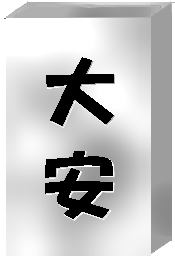
If you were to ask the Rokuyō calendar "When's the best day to do literally anything?" the answer would be Taian.
Taian is a day of great peace, considered the finest day for wedding ceremonies, starting new business ventures, having success in love, exams, etc.
It's also a good day for surgery, starting building projects, moving house, travelling, and other important endeavours. Even the Japanese Prime Minister picks Taian for appointing new Cabinet ministers. Quite an endorsement!
As a pictograph, Taian's first kanji 大 represents a person standing tall with arms and legs outstretched, appearing as large as possible.
The second kanji 安 is in two parts; the upper representing a roof, and by extension, a building or home. The lower part represents a kneeling woman. She's at rest in her home. An earlier pictograph for "woman" referred to a woman sitting on a thin item; a cloth during menstruation, resting quietly.
Put together, Taian literally embodies "big" + "peace", as with a huge sigh of relief.
Fun fact: the second kanji 安 can also mean "inexpensive". But don’t mistake that for cheap, shoddy or low quality; rather it implies something valuable at a low cost, the kind of deal you’d brag about to your friends.
As mentioned, the first kanji also symbolises a person, attaching Taian to good fortune in a personal sense rather than just in events. If you’ve been putting off something important, Taian is the cosmic green light you’ve been waiting for.
While Rokuyō is often associated with Buddhist traditions, some Shinto shrines also consider Taian a particularly auspicious day for rituals and blessings.
There's an obscure link between taian and old court culture. In the Heian period (794–1185), aristocrats relied heavily on onmyōdō (Japanese esoteric cosmology) and the yin-yang calendar, which influenced Rokuyō’s development. While Taian wasn't explicitly mentioned in early records, lucky and unlucky days were carefully observed for court ceremonies, marriages and imperial decrees. The modern association of Taian with weddings echoes this ancient belief system.
More obscure is Taian's connection to lucky and unlucky colours. In some esoteric Japanese traditions, Taian is associated with specific lucky colours that vary by season. For example, wearing gold or yellow on a Taian day in autumn is thought to amplify its auspiciousness, while white or silver is favoured in winter. This concept is rarely discussed today but has roots in ancient colour-based superstitions.
Shugendō, a mystical blend of Shinto, esoteric Buddhism and mountain asceticism, sometimes associated ritual garments and talismans with lucky colours. Some mountain monks (yamabushi) believed wearing white or gold on Taian days strengthened spiritual power and protected against misfortune. This belief paralleled certain Tendai and Shingon Buddhist esoteric teachings on cosmic harmony and auspicious timing.
Not everyone followed Taian’s lucky logic - some military leaders used it to their advantage. Take Oda Nobunaga in the 1581 Iga Invasion. His enemies, the Iga warriors, followed superstitions about auspicious days such as Taian, avoiding battle on “unlucky” days. So what did Nobunaga do? He attacked on Butsumetsu (the unluckiest day), catching them completely off guard. Result? Victory through anti-superstition warfare.
Some Kyoto geisha houses (okiya) quietly observe Taian when selecting new maiko (apprentice geisha). The belief is that starting a maiko’s career on an auspicious day ensures grace, beauty and long-term success in the profession. This is an extremely niche and rarely documented practice.
In certain rural Japanese folklore, travelling at night on Taian is considered dangerous, not because of bad luck, but because it's believed that ghosts (yūrei) are also active on auspicious days. The reasoning is that spirits are drawn to human celebrations and major life events, making them more likely to wander on Taian nights.
Final thought: Taian is the feel-good day of the Rokuyō calendar - a universal "Go for it!" from the cosmos. Whether or not you believe in lucky days, Taian has stood the test of time as Japan’s undisputed champion of good fortune. So if you’re making a big move, why not give yourself an extra boost of luck?
At worst, it’s just another day. At best, it could be your best day yet.
Also known as
Daian